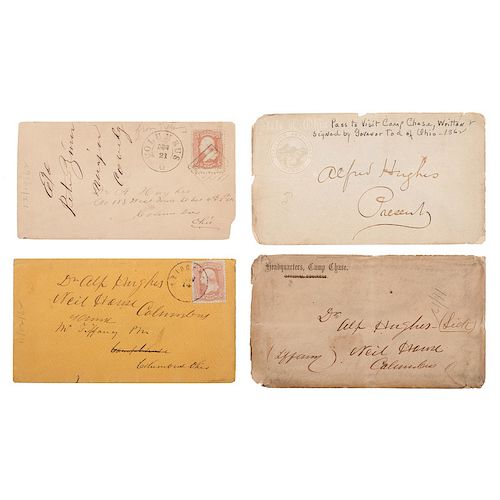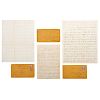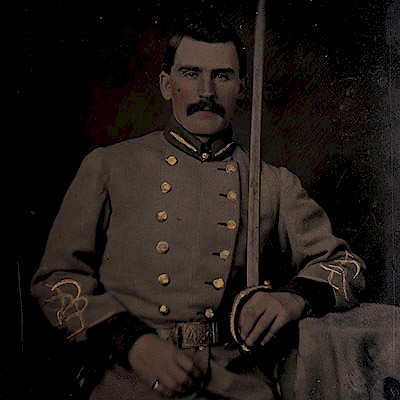CSA POW Manuscript Archive of Dr. Alfred Hughes and his Medically Trained Sister Dr. Eliza C. Hughes, Incl. Rare Cover with Examiner's Marks
About Seller
6270 Este Ave.
Cincinnati , OH 45232
United States
With offices in Cincinnati, Cleveland and Denver, Cowan’s holds over 40 auctions each year, with annual sales exceeding $16M. We reach buyers around the globe, and take pride in our reputation for integrity, customer service and great results. A full-service house, Cowan’s Auctions specializes in Am...Read more
Two ways to bid:
- Leave a max absentee bid and the platform will bid on your behalf up to your maximum bid during the live auction.
- Bid live during the auction and your bids will be submitted real-time to the auctioneer.
Bid Increments
| Price | Bid Increment |
|---|---|
| $0 | $25 |
| $500 | $50 |
| $1,000 | $100 |
| $2,000 | $250 |
| $5,000 | $500 |
| $10,000 | $1,000 |
| $20,000 | $2,500 |
| $50,000 | $5,000 |
| $100,000 | $10,000 |
About Auction
Jun 22, 2018
Cowan’s American History: Premier Auction, scheduled for June 22, 2018 is comprised of early photographs, documents, manuscripts, broadsides, flags, and more dating from the Revolutionary War, the Civil War, Late Indian Wars, World War I and II and beyond. Cowan's Auctions dawnie@cowans.com
- Lot Description
Lot of 11. Collection includes (7) Civil War-date covers, some with rare examiner's marks, three (3) letters, and a pass issued to paroled political prisoner Dr. Alfred Hughes signed by Ohio Governor David Tod.
Dr. Alfred Hughes (1824-1880) was a born in Wheeling, (West) Virginia, to a prominent family. His ancestors were Irish Catholics who had emigrated to Virginia in the early 1700s, and his father was a veteran of the War of 1812. Dr. Hughes, the seventh of ten children, studied medicine at the Homeopathic Medical College of Philadelphia before graduating in 1853. Upon graduation he returned to Wheeling and established a successful practice. Interestingly, assisting him in his practice was his sister Eliza Clark Hughes (1817-1882), a female pioneer in the field of medicine. Eliza commenced the formal study of medicine in 1855, and followed in her brother's footsteps graduating from the Pennsylvania Medical College in 1860. Dr. Eliza Hughes was among the first female medical school graduates in the country, and was the first female medical practitioner in the state of Virginia.
At the outbreak of the Civil War, Dr. Alfred Hughes' sympathies remained with the South and he refused to sign an oath of allegiance to the Union. As a correspondent for the pro-Confederacy Baltimore Exchange, Hughes' writings against the Lincoln administration ultimately branded him a traitor. Civil War prisoner of war records indicate that Dr. Alfred Hughes, "citizen" was captured "at home" in Wheeling on May 30, 1862, and was received on June 6, 1862. Hughes was taken to Camp Chase, a Union-operated prison camp in Columbus, OH, where he was held for approximately seven months.
The first letter in the collection, 3 pages in length, is from Eliza to her brother Alfred, and was written just after his imprisonment. "Wheeling Va June 8th/62. My Dear Brother," she writes, "...Mother was here last night she and all the children send their love. All wish to be kindly remembered to yourself and fellow prisoners....A small man watched the house on Friday night. I kept watch until 12 oclock from the upper window. I think I know him from his dress as he has not the precaution to change it. However it is very comfortable to have the house guarded without incurring the expense of having it done." Eliza further discusses personal matters and news from the city.
The next letter in the collection is from Dr. Alfred Hughes to his wife, Mary Adrian Hughes, and was written while he was incarcerated at Camp Chase. The three page letter, dated Oct 1, 1862, is numbered "No. 80," presumably so that Dr. Hughes can be certain that all of his letters are reaching his wife. He discusses his affection for her and his great appreciation for her letters, he writes of his faith, and of his hope that he will soon be released: "I forgot to tell you there was about two hundred and upwards of prisoners of war left here.... Those to whom we gave messages to place our cases before the Confederate Government, assured us they would do so the very first thing they would do on reaching Richmond. And for us by no means to despair or think of doubting. That the Confederate Government had no idea there was so many of her citizens imprisoned here. Indeed they themselves had not the most distant idea there was anything like it. My faith that the Confederate Government is now and perhaps by this time has already made arrangements for our release - for a general release of all political prisoners against whom there is no civil crime alleged, is unlimited and unbounded - indeed I can have no doubt of it whatsoever." However, a warning accompanies his otherwise optimistic letter in the form of a brief note, "The reason I wrote to you to be carefull how you write I was afraid the letters might be examined so you had better not write any thing that you cared for". This letter comes with the cover which is postmarked Columbus, O[hio],Oct. 2, with a cancelled 3 cent rose George Washington postage stamp, and the handwritten note at the top of the envelope "Examined Peter Zinn/Maj. Com. Post."
The final letter in the collection is written from Eliza to her brother, "Wheeling Va Nov 12,/ 62." Elizabeth provides a fascinating glimpse into her medical work, as she consults with patients and seeks to continue her practice during her brother's absence. She also implores him to remain in good cheer as she works to secure an exchange for him. "[I] also intend as you directed to ask Dr. Dake to consult with me, he can do no more than refuse if he does not wish to do so...I wrote to the person to whom I offered my services when this terrible War broke out. I ask him to intercede for an exchange for you, also some others of the same place...all are doing everything that lays in our power to get you out of that dismal Bastille..." This letter comes with the cover which is addressed to Mr. D.B. Tiffany at Camp Chase, with a cancelled 3 cent rose George Washington postage stamp, and the handwritten note "Examined Tiffany."
The final letter, dated November 21, 1862, is a pass issued to Alfred Hughes and signed by Ohio Governor Daniel Tod, with the text [in full] "Alfred Hughes a Paroled Political Prisoner is permitted to visit Camp Chase this day."
Three additional covers from correspondence addressed to Alfred Hughes, all containing examiner's marks, round out the collection.
As both Drs. Hughes hoped, Alfred Hughes was released in December 1862 as part of a prisoner exchange. He then moved to Richmond, VA. In late 1865 he removed to Baltimore, the birthplace of his wife, where he had a lengthy career as a physician. Counted among Dr. Alfred Hughes patients was Mary Anna Custis Lee, the wife of General Robert E. Lee. Dr. Eliza Clark Hughes was a Southern sympathizer like her brother. During and after the war she continued in her groundbreaking work as a female physician. Serving mostly women and children, Eliza Hughes practiced in Wheeling until her death in 1882.
Writing on letter from Alfred to his wife is faint in places, however, all text is legible.Condition
Eliminate the Hassle of Third-Party Shippers: Let Cowan's Ship Directly To You!
If you'd like a shipping estimate before the auction, contact Cowan's in-house shipping department at shipping@cowans.com or 513.871.1670 x219. - Shipping Info
-
Buyers are required to pay for all packing, shipping and insurance charges. Overseas duty charges are the responsibility of the successful Bidder. Be aware that for larger and/or valuable items, shipping charges can be substantial. - If there is no shipping amount on listed your invoice, you will need to make arrangements to pick up or ship your purchase through an alternative shipping company. Our shipping department can be contacted at 513.871.1670 (ext. 219) or email shipping@cowans.com. - Shipping charges include insurance for your order while in transit. If you have private insurance we will adjust your charge to include only packing and shipping. - Please allow 14 – 21 days after payment to package and ship your purchase as carefully as possible.
-
- Buyer's Premium



 EUR
EUR CAD
CAD AUD
AUD GBP
GBP MXN
MXN HKD
HKD CNY
CNY MYR
MYR SEK
SEK SGD
SGD CHF
CHF THB
THB












